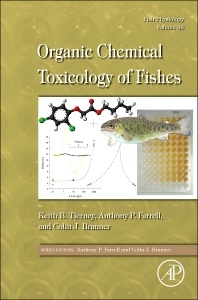Fish Physiology: Organic Chemical Toxicology of Fishes Fish Physiology Series
Coordonnateurs : Tierney Keith B., Farrell Anthony, Brauner Colin

Fish Physiology: Organic Chemical Toxicology of Fishes discusses the different types of organic chemical contaminants and their respective toxic effects in fish. The book also covers the detection of dissolved organic compounds and methods to assess organic toxicity. Substances addressed in this book include organometallics, hydrocarbons, endocrine disrupting compounds (EDCs), insecticides, herbicides, and pharmaceuticals.
Fish are exposed to an ever-increasing array of organic chemicals that find their way into rivers and oceans. Some of these compounds are no longer being produced but nonetheless persist within the environment (persistent organic pollutants, or POPs). The exposure of fish to toxic organic compounds has potential impact on human, fish, and ecosystem health. Yet the regulations that govern environmental water quality vary worldwide, and compliance is never complete. This book provides a crucial resource on these issues for researchers in zoology, fish physiology, and related fields; applied researchers in environmental monitoring, conservation biology, and toxicology; and university-level students and instructors in these areas.
1. Introduction: Organic contaminants in the environment and fish2. Persistent Organic Pollutants (POPs)3. Organometallics4. Hydrocarbons5. Endocrine disrupting compounds (EDCs)6. Insecticides7. Herbicides8. Pharmaceuticals9. Emerging threats10. Dealing with mixtures.
Dr. Tony Farrell is a Professor Emeritus in the Department of Zoology & Faculty of Land and Food Systems at the University of British Columbia and a Fellow of the Royal Society of Canada. His research had provided an understanding of fish cardiorespiratory systems and has applied this knowledge to salmon migratory passage, fish stress handling and their recovery, sustainable aquaculture and aquatic toxicology. He has over 490 research publications in peer-reviewed scientific journals and an h-factor of 92. He has co-edited of 30 volumes of the Fish Physiology series, as well as an award-winning Encyclopedia of Fish Physiology. As part of his application of physiology to aquaculture, he has studied the sub-lethal impacts of sea lice and piscine orthoreovirus on the physiology of juvenile salmon. Dr. Farrell has received multiple awards, including the Fry Medal, which is the highest honour to a scientist from the Canadian Society of Zoologists, the Beverton Medal, which is the highest honour to a scientist from the Fisheries Society of the British Isles, the Award of Excellence, which is the highest honour of the American Fisheries Society and the Murray A. Newman Awards both for Research and for Conservation from the Vancouver Marine Sciences Centre. He is a former President of the Society of Experimental Biologists and a former Editor-in-Chief for the Journal of Fish Biology. He served as a member of the Minister’s Aquaculture Advisory Committee on Finfish Aquaculture for British Columbia and was a member of the Federal Independent Expert Panel on Aquaculture Science.
Dr. Colin Brauner was educated in Canada at the University of British Columbia (Ph D), followed by a Post-doctoral fellowship at Aarhus Universit
- Organized by type of toxic organic chemicals
- Includes metals, POPs, EDCs, herbicides, insecticides, and pharmaceuticals
- Measures toxicity in a variety of ways aside from lethality
- Probes the toxic effects of compound mixtures as well as single pollutants
Date de parution : 01-2014
Ouvrage de 574 p.
15x22.8 cm



